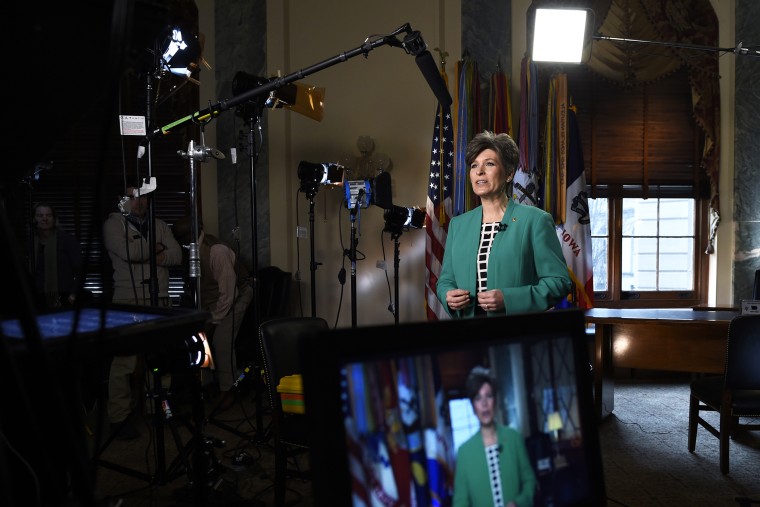Both parties felt like they had something to prove in the aftermath of Tuesday night’s State of the Union address: Democrats want to be seen as saviors of the middle-class, and Republicans are trying cast themselves as the new defenders of America’s underclass.
While President Barack Obama focused on “middle-class economics” in his speech, Republican Sen. Joni Ernst emphasized her family’s economic hardships growing up, connecting them to the concerns of ordinary Americans. "You see, growing up, I had only one good pair of shoes. So on rainy school days, my mom would slip plastic bread bags over them to keep them dry,” Ernst said, describing her work on the family farm, construction, and Hardee’s when she was growing up.
RELATED: Obama’s top five State of the Union zingers
Ernst went on to describe the “stagnant wages and lost jobs” that continue to hold back ordinary Americans, then brought her speech back to her own humble roots. "Just look at my parents and grandparents. "They had very little to call their own except the sweat on their brow and the dirt on their hands” she said. “But they worked, they sacrificed, and they dreamed big dreams for their children and grandchildren.” The word "middle class" didn't come up once in her speech.
In terms of solutions, Ernst rehashed the main pillars of the Republican agenda: push back against Obamacare, create the Keystone Pipeline, and lower tax rates by simplifying the tax code.
But while the GOP’s core agenda hasn’t changed, Ernst’s personal story reflects a larger effort by leading Republicans to voice more sympathy for America's poor.
In his own State of the Union response, Sen. Mike Lee of Utah focused on the “inequality crisis” that has punished the poor as well as the middle class. Lee, however, maintains that the government is responsible for killing economic mobility among the poor, whom he describes as “being trapped in poverty by big-government programs.” Lee’s proposed reforms include cutting benefits through means-testing welfare, among other changes.
As the party looks toward 2016, potential GOP contenders are also paying early lip service to the poor. Responding to Obama’s speech, Jeb Bush slammed Obama’s middle-class tax plan and stressed the need to help the poor as well. “We need to create economic opportunity for every American, especially middle class families and those trying to rise out of poverty,” Bush said in a Facebook post.
On Friday, Mitt Romney similarly spoke of the need to fight the “scourge of poverty” at a Republican National Committee event. “I believe in the post-Obama era we need to stand for safety, and for opportunity for all people, and we have to stand for helping lift people out of poverty,” Romney said, making his first public appearance since telling donors he was considering a third presidential bid.
It’s just the latest iteration of the Republican Party’s attempt to rebrand itself as more sympathetic to the poor. That effort has included some concrete policy ideas with bipartisan support. Both Lee and Rand Paul have found common ground with Democrats who want to reform the criminal justice system to be less needlessly punitive. Rep. Paul Ryan and Sen. Marco Rubio have both supported an expansion of the Earned Income Tax Credit for lower-income American workers.
RELATED: Rep. Steve King calls Obama’s SOTU guest a ‘deportable’
In fact, the "poor" and "middle-class" are just two sides of the same core issue of economic mobility that both parties are trying to embrace. Obama's agenda for 2015 also includes an EITC expansion, and the "middle-class" is as much an aspiration as a pre-existing constituency. But Democrats are also making a concerted effort to move beyond an inequality agenda that had focused significantly on lower-wage workers. As the economy has improved, the safety net has also become less of an urgent priority, with unemployment declining and food stamp participation beginning to ebb.
And facing the next presidential election, Democrats are instead trying to appeal to a broader swath of middle-income Americans who failed to show up or vote for them in the 2014 midterm elections. And Republicans, for their part, are trying to make up for their party’s own weaknesses after losing the last presidential race with a candidate who came across as anything but underprivileged.
